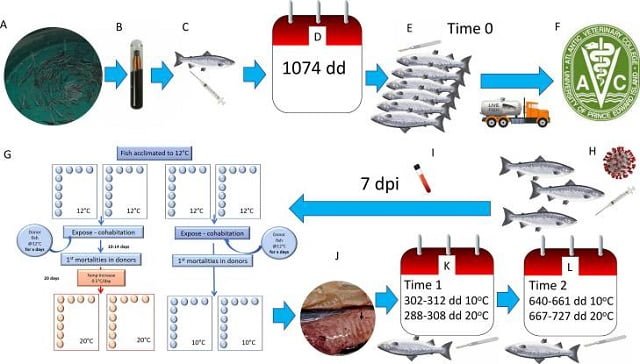
Ocean temperatures continue to rise annually due to the consequences of climate change. These temperature changes can have an impact on the immune robustness of farmed fish.
On the other hand, infectious salmon anemia (ISA) is a viral disease that causes millions of dollars in losses each year in the Atlantic salmon (Salmo salar) industry.
The temperature increase can alter the virulence of the pathogen and/or the temporal and spatial prevalence. In the case of ISAv, the lack of prophylaxis or intervention strategies increases the risks.
A team of researchers from the University of Prince Edward Island, City University of Hong Kong, and Huntsman Marine Science Centre hypothesized that there would be variability in susceptibility to ISAv among different families and that this variation would be related to antiviral responses.
The scientists’ second hypothesis was that high temperatures (20 °C) would initiate a stronger/faster immune response to the virus in Atlantic salmon, resulting in lower mortality.
They examined 20 families from an Atlantic salmon breeding program from the Saint John River and their natural resistance and vaccine-induced resistance to ISAv under two temperature regimes (10 °C and 20 °C).
Percentage of survival against ISAv
“During the course of the study, the salmon maintained at 10 °C experienced the highest total mortality compared to the fish at 20 °C,” report the researchers.
According to the study’s results, virus replication or virulence increases at some temperature between 10 °C and 20 °C, allowing for the peak mortality observed at the higher temperature, and then decreases dramatically thereafter and/or the host response also improves between these temperatures.
Condition factor and fish weight
According to the study results, the condition factors of salmon between 10 °C and 20 °C were not significantly different.
Stay Always Informed
Join our communities to instantly receive the most important news, reports, and analysis from the aquaculture industry.
“In our study, a temperature of 20 °C was associated with 80% oxygen saturation, and a temperature of 10 °C was associated with 100% oxygen saturation, although the results do not reveal a significant difference in condition factor,” they reported.
Vaccination effectiveness
“There were no significant differences in survival between vaccinated and non-vaccinated fish,” they emphasized.
According to the scientists, the study demonstrated that higher levels of protection, as well as the production of specific ISAv antibodies, were found in the vaccine containing the highest antigen dose.
Expression of immune genes
The scientists examined the kidneys of infected salmon at two temperatures over time to determine immune gene expression using MagPix multiplex and qRT-PCR.
ISAv infection under the two temperature regimes affected the expression of these genes. Several interferon signaling pathway genes and T-cell genes were upregulated at 10 °C.
The scientists also found that ISG15 mRNA expression was significantly higher in fish exposed to 10 °C.
“Based on the results of this study, it seems possible that the production of ISG15 increased at 10 °C, due to the slight increase in viral load also observed at the lower temperature, in an attempt to decrease viral replication and its associated host damage.
Conclusion
“The study demonstrated that temperature plays an important role in the progression of infectious salmon anemia and the virus’s ability to invade the salmon’s immune system,” they conclude.
According to the scientists, the salmon’s immune system’s ability to upregulate the genes necessary to defend against the virus and the virus’s difficulty in replicating at 20 °C seem to mutually play a role in overall survival at the higher temperature.
Finally, the scientists highlight that there is evidence of familial resistance to ISAv, but more work is needed to identify appropriate markets for selection and improve ISAv vaccines.
The study was funded by the Atlantic Canada Opportunities Agency (ACOA) – Atlantic Innovation Fund (Grant – MICCSA).
Contact
MD Fast
Atlantic Veterinary College
UPEI,
550 University Avenue, Charlottetown, PE C1A 4P3, Canada.
Email: mfast@upei.ca
Reference (open access)
Groves L, Whyte SK, Purcell SL, Michaud D, Cai WC, Garber AF, Fast MD. Temperature impacts Atlantic salmon’s (Salmo salar) immunological response to infectious salmon anemia virus (ISAv). Fish Shellfish Immunol Rep. 2023 May 27;4:100099. doi: 10.1016/j.fsirep.2023.100099. PMID: 37293549; PMCID: PMC10245120.
Editor at the digital magazine AquaHoy. He holds a degree in Aquaculture Biology from the National University of Santa (UNS) and a Master’s degree in Science and Innovation Management from the Polytechnic University of Valencia, with postgraduate diplomas in Business Innovation and Innovation Management. He possesses extensive experience in the aquaculture and fisheries sector, having led the Fisheries Innovation Unit of the National Program for Innovation in Fisheries and Aquaculture (PNIPA). He has served as a senior consultant in technology watch, an innovation project formulator and advisor, and a lecturer at UNS. He is a member of the Peruvian College of Biologists and was recognized by the World Aquaculture Society (WAS) in 2016 for his contribution to aquaculture.







